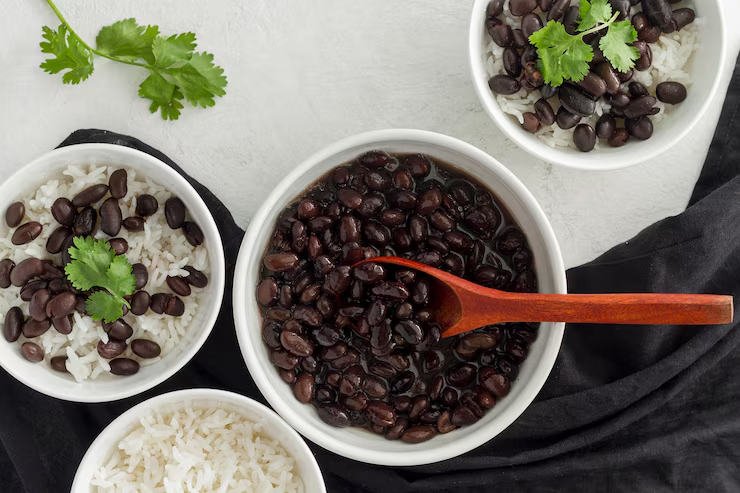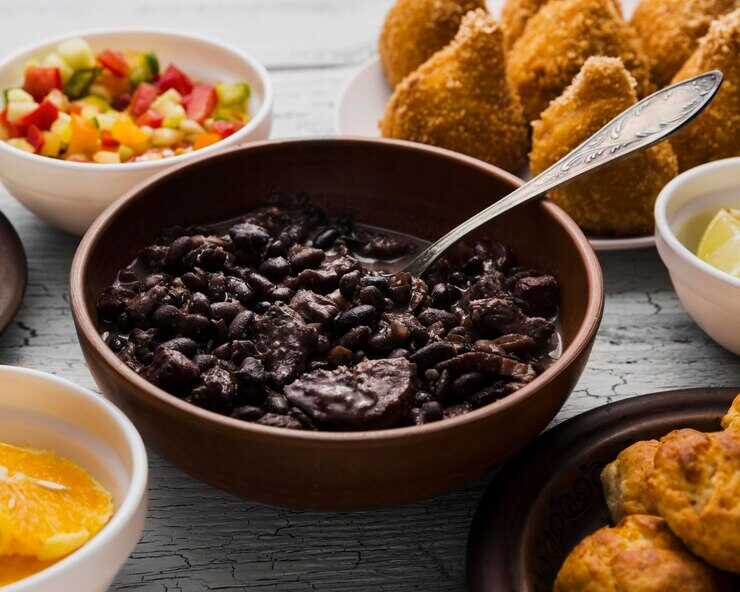Black beans are a popular and versatile legume enjoyed worldwide for their rich flavor, high fiber, and impressive nutrient profile.Packed with protein, magnesium, antioxidants, and complex carbohydrates, they’re considered a staple in many healthy diets.
Their low glycemic index also makes them appealing for those monitoring blood sugar levels.For individuals managing diabetes, choosing the right foods is crucial, which raises the important question: Is black beans good for diabetics? Understanding how black beans affect blood sugar and insulin response can help determine their place in a diabetes-friendly diet.
Diet plays a central role in controlling type 2 diabetes, helping to regulate blood sugar and improve overall health. Incorporating nutrient-dense foods like black beans can support these goals when consumed mindfully. In this article, we’ll explore the science behind black beans and their benefits for people living with diabetes.

Understanding Diabetes and the Role of Diet
Type 2 diabetes is a chronic condition characterized by the body’s inability to properly use insulin, a hormone that helps regulate blood sugar levels. In people with type 2 diabetes, either the body doesn’t produce enough insulin or the cells become resistant to its effects.
This leads to elevated blood sugar, which, if unmanaged, can cause serious health complications like heart disease, nerve damage, and kidney problems.
Blood sugar regulation is essential for managing diabetes effectively. When we eat carbohydrates, they are broken down into glucose, which enters the bloodstream. Insulin helps move this glucose from the blood into cells, where it’s used for energy. However, in type 2 diabetes, this process is impaired, causing glucose to accumulate in the blood.
Diet plays a pivotal role in controlling blood sugar. Foods rich in fiber, complex carbohydrates, and plant-based proteins slow down digestion and glucose absorption, leading to more stable blood sugar levels.
Fiber, especially soluble fiber, can improve insulin sensitivity, making it easier for the body to regulate blood sugar. Plant-based proteins also have minimal impact on blood glucose compared to animal proteins or processed foods.
Incorporating these nutrient-dense foods supports better blood sugar regulation and is a cornerstone of diet for diabetes management.
Black Beans and Diabetes—What the Research Says
Nutritional Overview of Black Beans
Black beans are a powerhouse of nutrition, offering a rich source of fiber, protein, magnesium, and antioxidants—all essential nutrients for people managing diabetes. Their unique nutrient composition helps support blood sugar control and overall health.
| Nutrient | Amount per 1/2 cup cooked (approximate) | Benefits |
| Calories | 114 | Provides energy without excess calories |
| Total Carbohydrates | 20 grams | Complex carbs for steady glucose release |
| Dietary Fiber | 7.5 grams | Promotes satiety, slows digestion |
| Protein | 7.5 grams | Supports muscle maintenance, blood sugar control |
| Magnesium | 60 mg (15% DV) | Enhances insulin sensitivity |
| Antioxidants | High (including flavonoids) | Reduces oxidative stress |
| Glycemic Index (GI) | ~30 | Low GI food that helps prevent spikes |
The low glycemic index (GI) of black beans (~30) means they cause a slower, more gradual rise in blood sugar compared to high GI foods. This makes them particularly suitable for individuals looking to maintain stable blood glucose levels.
How Black Beans Affect Blood Sugar
Black beans have a unique composition that supports balanced blood sugar regulation. Their high fiber content, especially soluble fiber, slows the digestion process. This slow digestion means glucose is released gradually into the bloodstream, preventing sudden blood sugar spikes after meals.
Moreover, black beans are rich in resistant starch—a type of carbohydrate that resists digestion in the small intestine and ferments in the colon. This fermentation produces beneficial short-chain fatty acids that support gut health and improve glucose metabolism. Resistant starch also contributes to better insulin sensitivity, helping the body utilize glucose more effectively.
The protein content in black beans further aids in blood sugar control by promoting satiety, which can reduce overeating and help with weight management—another critical factor in diabetes management.
Benefits for Diabetics
For people with diabetes, black beans offer several key benefits:
Reduced Post-Meal Glucose Spikes: The slow digestion of black beans leads to smoother blood sugar curves, reducing the risk of sharp glucose spikes that can stress the body.
Satiety and Weight Management: High fiber and protein content keep you feeling fuller longer, which helps prevent overeating and supports healthy weight.
Plant-Based Protein Source: For those reducing red meat intake due to cardiovascular concerns, black beans provide a heart-healthy protein alternative.
Magnesium Boost: Magnesium in black beans improves insulin function and glucose regulation.
These benefits make black beans a smart addition to a diabetes-friendly diet, contributing to both blood sugar control and overall health.
How to Include Black Beans in a Diabetic Diet
Incorporating black beans into your meals is simple and delicious. Here are some ideas and tips:
Meal Ideas: Add black beans to salads, soups, chili, burrito bowls, or make creamy bean dips like black bean hummus.
Portion Control: A standard serving of 1/2 cup cooked black beans contains roughly 20 grams of carbohydrates. This portion size fits well within typical carbohydrate allowances for many diabetic meal plans.
Best Pairings: Combine black beans with non-starchy vegetables, whole grains (like quinoa or brown rice), and lean proteins (such as chicken or fish) to create balanced meals that further support blood sugar regulation.
Being mindful of portions and pairings helps maximize the blood sugar benefits of black beans without overloading on carbohydrates.
Comparison with Other Beans
Black beans are one of several bean varieties beneficial for diabetes, but they have some advantages compared to others:
| Bean Type | Glycemic Index | Fiber (per 1/2 cup cooked) | Protein (per 1/2 cup cooked) |
| Black Beans | ~30 | 7.5 g | 7.5 g |
| Kidney Beans | ~24-30 | 6.5 g | 7.7 g |
| Chickpeas | ~28-36 | 6 g | 7.3 g |
| Pinto Beans | ~39 | 7 g | 7 g |
While kidney beans have a slightly lower GI, black beans are comparable and still very low, making them excellent for blood sugar control. Chickpeas and pinto beans also provide benefits, but pinto beans tend to have a slightly higher GI.
Myths & Misunderstandings
A common misconception is that “all beans spike blood sugar,” leading some to avoid legumes altogether. While it’s true that beans contain carbohydrates, these are complex carbs balanced by fiber and protein, which mitigate blood sugar impact. Unlike simple sugars or refined carbs, black beans digest slowly, promoting stable glucose levels.
It’s important to understand that not all carbohydrates are created equal. Black beans are among the best beans for diabetics because their nutritional profile supports blood sugar regulation rather than causing spikes.
Research supports black beans as a nutritious, diabetes-friendly food that helps regulate blood sugar due to their high fiber, protein, and resistant starch content. Including black beans in a balanced diet can reduce glucose spikes, improve satiety, and provide plant-based protein and essential nutrients.
Compared to other beans, black beans hold their own as a low-GI, high-fiber option ideal for blood sugar management.
The Role of Medical Supervision
When managing diabetes, it’s essential to consult with a healthcare provider—such as a doctor or registered dietitian—before making significant changes to your diet, including adding foods like black beans.

While black beans offer many benefits for blood sugar regulation, each individual’s needs and health conditions are unique. A medical professional can help tailor dietary recommendations that fit your specific health profile and treatment plan.
Even healthy foods must be consumed within the context of total carbohydrate limits and balanced meals. For example, although black beans have a low glycemic index and high fiber, they still contain carbohydrates that affect blood sugar.
Portion control and meal timing are critical factors that vary between individuals and need professional guidance.
Importantly, black beans and other dietary choices should be viewed as complementary to, not a replacement for, prescribed medical treatments such as medications or insulin therapy.
Nutrition plays a vital role in managing diabetes, but it works best alongside regular monitoring, medical supervision, and a comprehensive diabetes management plan designed by healthcare professionals.
FAQs
Are black beans good for type 1 and type 2 diabetes?
Yes, black beans can be beneficial for both type 1 and type 2 diabetes due to their high fiber, protein, and low glycemic index. They help stabilize blood sugar and improve satiety. However, portion control and overall diet balance remain important for managing blood glucose effectively in both types.
Do black beans spike blood sugar?
Black beans have a low glycemic index and are high in fiber, which slows digestion and helps prevent blood sugar spikes. When eaten in appropriate portions, they support stable blood glucose levels rather than causing rapid increases.
How much black beans can a diabetic eat per day?
A typical serving for diabetics is about ½ cup of cooked black beans, which contains roughly 20 grams of carbohydrates. Depending on individual carbohydrate goals, consuming 1 to 1½ cups spread throughout the day is generally safe, but it’s best to consult a healthcare provider for personalized guidance.
Are canned black beans okay for diabetics?
Yes, canned black beans are convenient and nutritious options for diabetics, but choose low-sodium varieties and rinse them well to reduce sodium content. Watch for added sugars or preservatives on labels, and consider portion sizes to manage carb intake.
Can black beans help lower A1C?
Black beans may help lower A1C by improving blood sugar control through their high fiber and protein content, which reduce glucose spikes and enhance insulin sensitivity. Including black beans regularly as part of a balanced diet can support long-term glucose management and better A1C levels.
Conclusion
Black beans are a nutritious and diabetes-friendly food, packed with fiber, protein, magnesium, and antioxidants. Their low glycemic index and slow digestion help promote stable blood sugar levels, making them a smart choice for people managing diabetes. Including black beans in your diet can support better blood sugar regulation and overall health.
However, moderation and variety remain essential. No single food can manage diabetes alone, so it’s important to balance black beans with other nutrient-rich vegetables, whole grains, and lean proteins. Portion control and individualized meal planning are key to maintaining optimal blood sugar levels and preventing spikes.
If you’re wondering, “Is black beans good for diabetics?” the answer is yes—when eaten thoughtfully as part of a balanced diet. Try adding a black bean salad or soup to your meal plan and track your blood sugar response to see how it fits your needs. This simple step can help you make informed, healthful choices every day.


